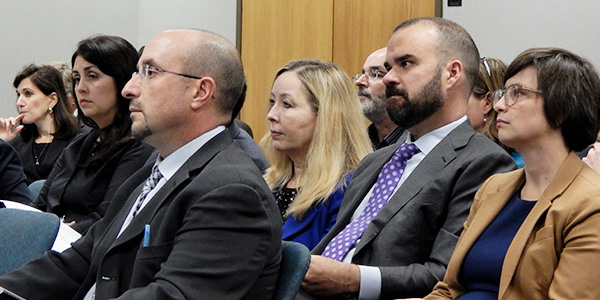By Tom Kleckner
AUSTIN, Texas — ERCOT market participants shared their thoughts with the Texas Public Utility Commission last week on how to address the energy-only market’s lack of scarcity pricing and slim reserve margins.
The consensus: There is no consensus.
Power companies and advocacy groups made their pitches during an Oct. 25 PUC technical workshop reviewing the market’s 2018 performance during a summer with an 11% reserve margin (Project 48551). Despite the tight margins and 14 system demand peaks bettering the 2016 record, the ERCOT market handled the summer heat without resorting to emergency actions.
Some participants suggested a shift in the loss-of-load probability (LOLP) used to calculate real-time reserves in ERCOT’s operating reserve demand curve (ORDC). Others suggested tweaking the ancillary services market. Still others said the market works just fine, thank you: No changes are necessary.
A common concern was that without higher prices and scarcity pricing this summer, the forward demand curve did not signal a need for additional generation.
“We view this discussion … as whether the current level of risk the signals in the energy-only market construct are delivering are considered acceptable,” said Michele Gregg, executive director of the Texas Competitive Power Advocates (TCPA), which represents generators, power marketers and retail providers. “The simple fact is that the lack of scarcity pricing only worsened the backward-dating forward curves, making future investment in dispatchable generation even more difficult.”
The TCPA recommends shifting the LOLP by up to one standard deviation, a position shared by Exelon.
“We believe the current scarcity pricing will not improve resource adequacy,” said Bill Berg, Exelon’s vice president of wholesale market development. “As we look ahead the next three or four years, it’s obvious to us the fleet is changing. A shift of one should shore up the existing fleet, support the renewable development we think is coming and leave enough new money in the market to incent new generation. We think 1.0 will keep you at a level where you can hold on for a few years.”
“We’re not afraid of high prices, when they are justified,” said Thompson & Knight attorney Katie Coleman, speaking for the Texas Industrial Energy Consumers trade association. “ERCOT is the only truly competitive market in the world, and we are proud of that. We think the market performed well this summer. We think you can expect that kind of performance to continue, because that is what the market is designed to do.”
“There’s no perfect answer here,” NRG Energy’s Bill Barnes said. “What we have is a competitive market. When there is scarcity, the prices should reflect a reliability risk. That did not match up this summer.”
Steve Reedy, the ERCOT Independent Market Monitor’s assistant director, noted several market participants had said similar generator outage rates shouldn’t be expected again in the future.
“I’ll point out that with the lower outage rates, we had a more secure, less risky system this summer, and that fed into the lower prices,” Reedy said. “Should we have the same events repeat next summer, but with our normal outage rate, we will see high prices, and we probably wouldn’t be talking about the need to change the LOLP.”
The PUC is moving quickly to address the feedback, with staff pulling together information from the workshop and written comments for a discussion by the commissioners as early as November.
PUC Chair DeAnn Walker said she wants to get an earlier start planning for the 2019 summer with ERCOT staff, market participants and other governmental agencies than she did last year. She plans to once again coordinate generator and transmission outages and ensure maintenance work is completed by May.
Walker is also scheduling time with Christi Craddick, chair of the Texas Railroad Commission, which regulates gas pipelines, to ensure the lines are operating. The two also worked together before this summer to handle pipeline outages, “but we were working on one contract, one pipeline at a time,” Walker said.
“I agree … that 2019 is going to be hard. There’s no steel in the ground coming, and everyone wants to move to Texas, but that’s a great thing. We keep getting more and more load,” Walker said. “I also believe our system and the whole dynamics of the market are changing. It’s going to be difficult down the road, and we need to think on that.”








